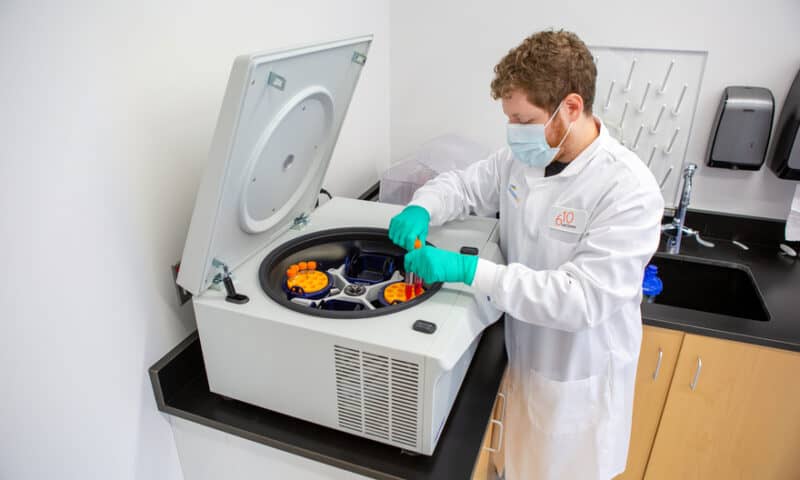Cell therapies have seen success in some blood cancers, but the same can’t be said for solid tumors. Several biotechs have sprung up to close that gap in different ways, but Catamaran Bio thinks single “linchpin” approaches won’t be enough. Instead, it’s taking a multipronged approach shepherded by a team of cell therapy and biopharma veterans.
Seeded by SV Health Investors, Catamaran launches with $42 million in combined seed and series A financing to develop off-the-shelf treatments based on natural killer (NK) cells. With its pipeline of CAR-NK cell therapies, the company hopes to go where today’s CAR-T treatments cannot.
“There is clearly a validation of cell therapy working with two products out there licensed,” said Houman Ashrafian, managing partner at SV Health Investors, referring to Gilead/Kite’s Yescarta and Novartis’ Kymriah, the first two FDA-approved CAR-T therapies. The FDA recently OK’d Tecartus, another CAR-T treatment from Gilead.
However, those treatments have some hurdles that stop them from being widely available. Besides not working in solid tumors, they’re made from patients’ own T cells, so manufacturing them can be expensive and time-consuming. They also come with safety challenges, such as cytokine release syndrome, in which the CAR-T cells activate the immune system too strongly.
Using NK cells rather than T cells can solve some of those problems. T cells are part of the adaptive immune system, meaning they need priming to hunt down invading pathogens or tumor cells that present antigens. NK cells are part of the innate immune system and don’t need such priming. Another plus is NK cells can be transplanted from a donor to a patient without causing graft-versus-host disease, making CAR-NK cells simpler and cheaper to manufacture than existing CAR-T treatments.
The proceeds will fuel the expansion of Catamaran’s Tailwind platform, based on the work of scientific founders Catherine Bollard, M.D., of George Washington University and Children’s National Hospital, and Branden Moriarty, Ph.D., of the University of Minnesota. It’s a suite of technologies for designing, genetically engineering and manufacturing allogeneic CAR-NK cell treatments. They will also push to lead CAR-NK programs toward the clinic in the next few years, said Vipin Suri, Ph.D., Catamaran’s chief science officer.
The company is keeping the targets of those programs under wraps, but Suri said they are new antigens expressed in a variety of solid tumors and occur at low levels in normal tissue.
Several factors set Catamaran’s approach apart from others in the space, Suri said, including the use of NK cell-specific CAR constructs rather than “borrowing” CARs from T cells and repurposing them for NK cells. Another piece is the use of switches that boost the CAR-NK treatments’ potency when looking to treat solid tumors.
“In solid tumors, targeting the tumor cells themselves is not sufficient. Solid tumors have a number of different ways to quiesce immune responses,” Suri said. Catamaran has designed its CAR-NK programs to take advantage of the signals tumor cells send out to quiet the immune response.
“We can neutralize those signals, or even use them as stimulatory signals. We have a toolkit that can design specific solutions for many different factors that tumors throw at immune cells,” Suri added.”
There are multiple players working on engineered NK cells, including Nkarta Therapeutics, Dragonfly Therapeutics and Kiadis, recently snapped up by Sanofi for $358 million. Others, like Allogene and Cellectis, are working on allogeneic T-cell treatments, made from donor cells.
“People often equate off-the-shelf with allogeneic, but it’s not quite that simple,” Ashrafian said. “Off-the-shelf treatments are required not only to be allogeneic, but they need to be easily manufactured and regulatorily compliant. They need the ability to go the last mile to the patient.”
Part of Catamaran’s solution is Tailwind’s nonviral engineering system, which takes away a key bottleneck in traditional virus-based cell engineering: namely, the time it takes to make the virus. It can also get around capacity limits of viral vectors, delivering large amounts of genetic cargo into NK cells, and allows for multiplexing—or doing multiple engineering steps at once—which can’t be done with viruses.
Catamaran hopes to create a “truly off-the-shelf product,” which means a treatment that can be frozen, rather than a fresh product similar to Kymriah or Yescarta, Suri said.
The goal is for patients to get treated within a day or two of when their doctor decides they would benefit from a cell therapy and not a month later, Suri said.

